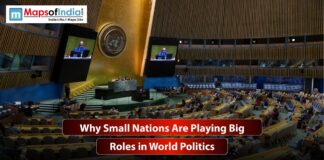The dynamics of global politics in recent years have become complex. The geopolitical shifts happening around the world are reshaping alliances. The U.S.–China rivalry is changing the dynamic around other nations. Conflicts in Ukraine and Gaza are still ongoing. A Lazard Geopolitical Trends report notes a fragmented world order. Climate crises and trade wars have become dominant agendas across the world. Elections in over 50 countries impact 2 billion people. The small changes in major countries are affecting small nations across the world. Polarization challenges democracies. Emerging powers like India are gaining influence across the globe.
Geopolitical Fragmentation and Rise of Multipolarity
The world order has started to fragment in recent years. Nowadays, a multipolar system has emerged across the globe. The U.S. and China are now competing for dominance of the world market. Tensions across this nation are heightened. Middle powers like India and Brazil are gaining influence in these conditions. Russia’s war in Ukraine is still ongoing. This conflict between developed nations is disrupting global trade. NATO strengthens with Finland and Sweden. With the increasing wars across the globe, Europe is increasing its defense budgets by 22%. A recent S&P Global report highlights supply chain shifts. The BRICS alliance is expanding with Saudi Arabia and the UAE. Regional blocs like ASEAN are navigating tensions across the globe. African nations are demanding UN Security Council reforms. Fragmentation is complicating global agreements. It drives localized diplomacy and innovation.
U.S. Policy Shifts and Global Realignment
The U.S. presidential election that happened in recent years has shaped the world’s geopolitics. A policy saying America First is likely to return, and it will affect the migrants there. To counter the Chinese market U.S. has raised the tariffs to 60% on Chinese goods. Trade wars strain alliances. A recent Ipsos What Worries the World survey shows 40% fear economic decline. U.S. reduces NATO funding commitments. According to the recent Lazard report, the allies of the U.S., like Japan, boost autonomy. Europe pivots to self-reliance in defense. Recent U.S. policies are more focused on domestic issues. This has created power vacuums in Asia and Africa. Foreign aid has dropped by 15%. A 2024 S&P Global report on geopolitical risks says isolationism is also on the rise. Global leadership dynamics are shifting. Allies adapt to the U.S. inward turn.
Ongoing Conflicts and Security Challenges
The conflicts around the different parts of the world are defining today’s global landscape. The war between Ukraine and Russia has entered its fourth year. This continuously ongoing war has become a reason for a lack of energy and food crises. Russia faces a 20% GDP strain from sanctions from countries across the world. Gaza’s conflict is also escalating, and no resolution can be seen. This war has caused more than 30000 casualties. Cyberattacks around the world have increased by 28%. The Sahel region has seen three coups since 2022. A 2023 UN report notes rising terrorism across Africa. Border disputes in South Asia are on the rise. India-China tensions persist along the LAC. Arms races are increasing in Indo-Pacific. Security risks disrupt global stability.
Economic Nationalism and Trade Disruptions
Economic sovereignty is reshaping the global world today. Protectionism has spiked globally. A Lazard report says U.S. tariffs fragment supply chains. China retaliates with export controls on rare earths. A S&P Global report notes a 15% trade volume drop. The EU is pushing for green trade policies. India is diversified with $500 billion in new trade deals. The rise of BRICS on the global level is challenging G7 dominance. The Global GDP growth across the world has slowed to 2.7%. Inflation persists at 5.5%. Southeast Asia is benefiting from supply chain shifts happening in the world. Vietnam has seen 8% export growth. Economic nationalism fuels local innovation. It strains global trade networks.
Climate Crisis and Migration Pressures
Climate change is also responsible for the political debates. Due to the Extreme weather conditions, more than 25 million people were displaced in 2025. An Ipsos What Worries the World survey shows 38% prioritize the environment. Floods happening in the Indian subcontinent affect 1.5 million people. A recent UN Migration report has seen a 20% rise in climate refugees. COP30 in Brazil is demanding $1.2 trillion for climate finance. A small island’s push for aid. Europe tightens there borders. The U.S. has seen 10% immigration policy shifts. Water scarcity is raising the tension in the Middle East. Climate change impacts geopolitics. Migration policies around the world are raising global debates. Climate action tests international unity.
Technological Rivalry and AI Governance
The rise in technological innovations across the world is also shaping world politics. The U.S.-China semiconductor chip war is escalating. A recent report by S&P Global says the U.S. has banned 70% of advanced chip exports. The rise of AI and how to use it has divided nations. EU’s AI Act sets strict rules. An OECD article notes a 30% compliance cost for firms. India’s data laws are protecting 1.4 billion users. A recent survey by Ipsos shows that more than 50% people are in fear of AI job losses. Cyber threats are also growing by 35%. China is leading the world in quantum tech patents. According to the recent Nature article says it holds a 60% share. Tech races are a driving force for innovation. They challenge global ethical standards.
Democratic Polarization and Global Elections
Democracies have started to face strain in recent years. Elections happening across 50 countries involve 2.2 billion voters. A recent Economist World Ahead report notes rising populism across Europe and South America. The polarization in the U.S. has deepened post-2024 election. Europe sees far-right gains in Germany and France. A World Politics Review article says 15% of democracies backslide. India’s recent elections test coalition stability. Abortion and minority rights are seeing polarized voters. A recent S&P Global report says nationalism rises 20%. Misinformation is raising unrest around the world. An Ipsos survey has seen 45% worry about governance across the world’s nations. Democratic erosion hinders global cooperation. It shapes 2025’s political future.
Conclusion
Global politics in recent years have been turbulent. Fragmentation is creating a multipolar world. U.S. policies are affecting the global alliances. Conflicts in Ukraine and Gaza are still ongoing. Economic nationalism is disturbing trade. Climate crises are fueling migration. Tech rivalries are escalating over AI and chips. Democracies are seeing a polarization response. These coming years will test global resilience. It demands adaptive leadership.





